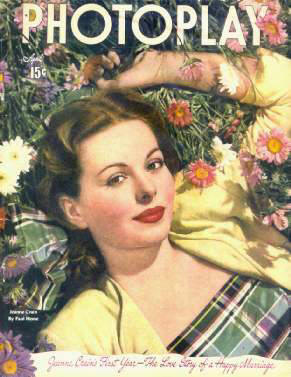In Remembrance: Jeanne Crain
 Jeanne Crain, the actress best known for her Academy Award nominated
performance in the controversial 1949 film Pinky has passed away on
Monday, December 15, 2003. She was 78.
Jeanne Crain, the actress best known for her Academy Award nominated
performance in the controversial 1949 film Pinky has passed away on
Monday, December 15, 2003. She was 78.
Born May 25, 1925 in Barstow, California, Crain moved to Los Angeles with her family as a small child. As a teen she participated in many beauty pageants. After winning Camera Girl of 1942, she was approached by 20th Century Fox with a standard studio contract. Craine’s first role was an uncredited part in the 1943 Busby Berkely musical The Gang’s All Here. However, after successfully landing leading roles in Home In Indiana, In The Meantime, Darling and Winged Victory (all 1944) the studio renegotiated her contract for better terms making Craine one of the leading stars at the studio.
 Craine’s slender figure and lovely features also made her a leading pin-up
girl among GI’s during World War II and the post-War years. Reportedly her
fan mail was second only to that of pin-up queen Betty Grable.
Craine’s slender figure and lovely features also made her a leading pin-up
girl among GI’s during World War II and the post-War years. Reportedly her
fan mail was second only to that of pin-up queen Betty Grable.
In 1949 director Elia Kazan cast her in Pinky, where she played a light-skinned southern black woman who passed herself off in society as white. It was a powerful performance in a powerful movie made at a time when Hollywood shied away from such progressive racial material. Ironically, although many black actresses campaigned for the role, including Lena Horne, studio head Darryl F. Zanuck demanded that a white actress play the part. The film was highly praised by critics but raised controversy in the South with its plotline of a white man wanting to marry Pinky despite knowing her race. The film was banned in Marshall, Texas, tough the town’s film censoring ordinance was later declared unconstitutional by the U. S. Supreme Court.
In 1950 she played the eldest daughter of Clifton Webb and Myrna Loy in the comedy Cheaper By The Dozen. Her last film at Fox was headlining the 1953 western City of Bad Men.
She continued to work after leaving Fox, starring opposite stars like Jane Russell (Gentlemen Marry Brunettes, 1955), Glenn Ford (The Fastest Gun Alive, 1956), Alan Ladd (Guns of the Timberland, 1959) and Frank Sinatra (The Joker is Wild, 1957).